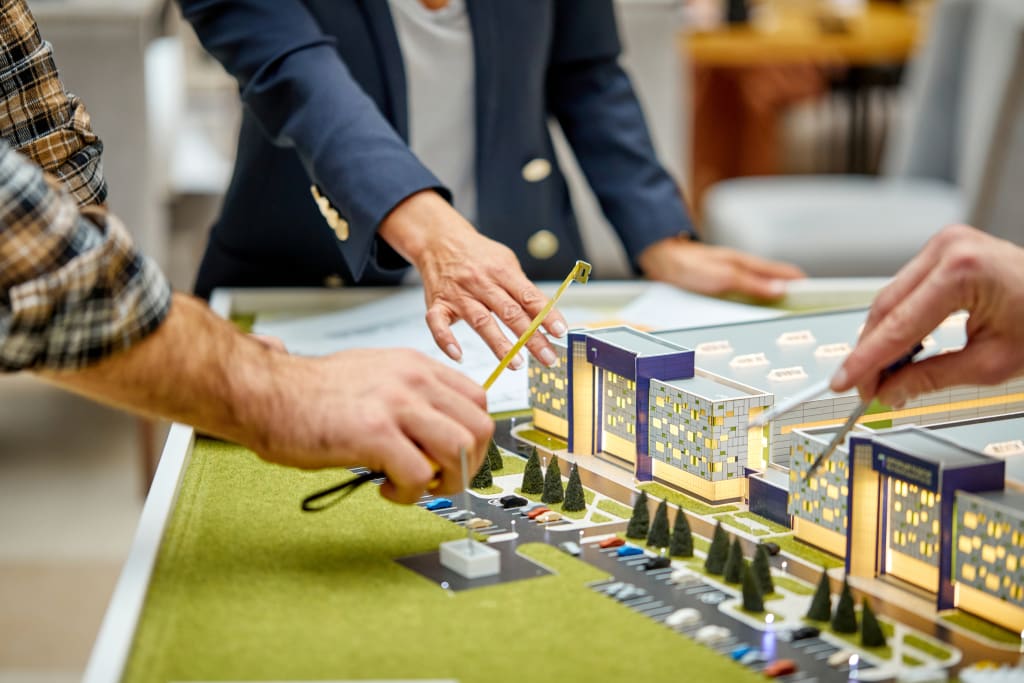
What is Pre-construction
Pre-construction is an initial phase that constitutes all the construction activities before the start of a construction project. In other words, the Pre-construction phase (after designing) includes planning and engineering services given by a construction company before starting construction.
The pre-construction phase needs to be through to ensure that a project is executed as planned and identify and address any possible requirements. Hence, constant communication between the core construction team and project consultant is an essential aspect of this phase.
Pre-construction is a difficult period with activities including identifying potential issues, planning and scheduling, the scope, cost estimation, and analysis of the job's needs. How efficiently these activities are performed determines the success or failure of a project.
Pre-construction planning stages
1. Design
The design stage of the Pre-construction process is executed by the owner, project manager and board members. This stage also includes the design team, which consists of architects and an engineering team.
The design team works with the owner to meet any sustainability or design requirements while adhering to safety and regulatory requirements.
- Tasks associated with this stage include:
- Design Coordination Meetings with clients and consultants
- Collection of all the Drawings and reviewing them.
Creating and designing a new project must be a collaborative process. This means that both the architectural and engineering teams must work in harmony.
2. Strategic plan development
A strategic development plan includes the scope, budget, and estimated timeline for completing the project.
The project's scope establishes what you are trying to accomplish and the requirements you must fulfill to meet a project's objectives.
The team can move forward with design plans and project specifics after a clear project scope and budget.
A strategic plan of development created throughout the project acts as a guide for each team member to turn to as needed.
3. Inspections, Permits, and entitlements
Pre-construction is the time to reduce the risks associated with a construction project. It involves inspecting the building site, permit requirements, and acquiring entitlements before and during construction.
You may obtain permits and entitlements concurrently with the planning process in some circumstances. The project manager guides the project through the permitting procedure.
4. Preparing Tenders
In this stage the construction company’s prepare tenders or bid packages for the various parts of the job. Here are some essential aspects of this stage:
- Listing different vendors for various works.
- Tender documents are issued to the shortlisted vendors.
- The queries raised by vendors are addressed in pre-bid meetings with consultants.
- Filled tender documents are collected and comparative statements are made.
- Finding the right vendor and initiating negotiation meetings.
5. Contract award stage, Contractor selection
You must hire a general contractor and subcontractors during the pre-construction phase.
General contractors manage the physical construction process, which includes acquiring labor and securing the services of any necessary personnel.
Selecting the general contractor is usually done through a bidding process. The process can include the following steps:
- Obtaining client's approval for Creating a contract with drawings.
- Gathering all relevant documentation from the chosen contractor.
- Issue the contract to the chosen vendor after gathering all documentation.
- Prepare a second cut budget based on the finalized contract values.
6. Project Material Procurement
Procurement is usually the last stage during the pre-construction phase. This stage starts the complex process of ordering, assembling, and staging all materials needed for project completion.
The contractor identified the necessary materials, focusing on how you will order the materials and, if any, requires early ordering.
You must approach this stage carefully to ensure that all necessary materials have been ordered and staged appropriately to best facilitate the construction schedule and process.
Also, to maximize efficiency, the time consumed during procurement is added to the overall schedule. This aids in timely delivery, phasing and staging of all materials.

The importance of pre-construction planning phase
The pre-construction planning process is essential for all parties involved in any construction project. Let's take a look at some key benefits of the pre-construction phase:
1. Defines The Objective Of The Project
The pre-construction phase will help you define clear objectives and achieve them most logically and cost-effectively.
Setting clear objectives ensures that everyone works together and clearly understands what must be done for the project's success.
2. Set A Schedule
A pre-construction plan established the project deadline and schedule to ensure that tasks are finished on time. A predetermined timeline helps in creating and achieving the critical project milestones.
3. Estimate The Costs
A meticulously designed pre-construction planning phase will assess accurate cost estimates and stick to them throughout the project.
The pre-construction plan assesses the costs of every aspect of the project to avoid any unpleasant surprises along the way.
4. Prevent Problems
A pre-construction plan takes into account potential roadblocks and setbacks that happen during the course of the project. It considers the necessary risks and hazards and puts in place an action plan for multiple unforeseen circumstances.
This helps the teams move forward with quick and efficient solutions, which helps a project run smoothly and successfully.
5. Avoiding Re-work
The pre-construction phase establishes regular communication and creates a cohesive team that works together from the planning to project completion.
This phase enables collaboration of ideas avoiding the need for rework. A formal plan eliminates the need for team members to question the decision-making processes.
Conclusion
The pre-construction phase can be highly complicated. It requires a significant amount of work to be done even before starting a project, but it is worth the effort.
An efficiently planned pre-construction phase ensures a fluent and efficient transfer of a construction design into reality. A skilled management service provider can help you build successful construction projects by navigating the pre-construction phase efficiently and effectively.
Author Bio: Natalie Hutchins has been an avid blogger for 5 years, with particular interests in Engineering and related technologies. She has consistently contributed articles to top AEC and industral publications. Currently She is associated with India CAD Works, an engineering services company.






Comments
There are no comments for this story
Be the first to respond and start the conversation.